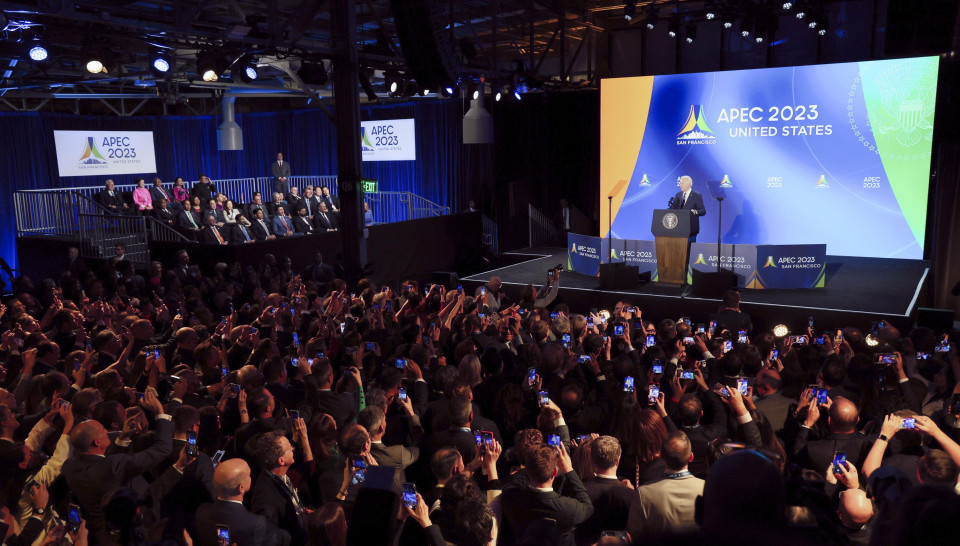The leaders of the 21 Asia-Pacific economies that collectively account for more than half of global trade faced a formidable challenge in trying to reach consensus as their summit got under way on Wednesday amid U.S.-China rivalry, Russia's war in Ukraine and the Israel-Hamas conflict.
Fresh out of a much-hyped meeting earlier in the day with Chinese President Xi Jinping, U.S. President Joe Biden is hosting the Asia-Pacific Economic Cooperation forum summit in San Francisco, with Russian President Vladimir Putin once more absent.
The United States is aiming to release a joint statement to wrap up the talks on Friday, covering a host of issues that impact the global economy, trade and investment.
APEC is a forum designed to promote multilateral free trade but trade restrictions under the name of protecting national security interests and growing calls for the reworking of China-dependent supply chains for critical items such as semiconductors have cast a shadow over liberalization efforts.

Ministers from the APEC members earlier sought to lay the groundwork for the leaders' summit based on the group's push for an "open, dynamic, resilient and peaceful" Asia-Pacific.
U.S. Trade Representative Katherine Tai, who chaired the two-day ministerial meeting from Tuesday with Secretary of State Antony Blinken, said progress was made on this year's priorities such as sustainability, resilience and inclusion.
But Tai also gave a glimpse into the difficulty of showing unity as she concluded the meeting, saying, "Building consensus around these principles and goals is important, but it's not everything."
Japan's trade minister Yasutoshi Nishimura said after the meeting that there were "differing views on the state of world affairs."
APEC trade ministers did not issue a consensus document at their gathering in May due to opposition from Moscow and Beijing to the wording on Russia's invasion of Ukraine, which began in February 2022.
The move dashed hopes for coordination as the world deals with the fallout from the COVID-19 pandemic and the war in Ukraine that has undermined energy and food security.
Earlier this week, U.S. Treasury Secretary Janet Yellen said APEC finance chiefs agreed to do everything possible to avoid the Israel-Hamas war escalating into a regional conflict and hurting their economies. But they did not issue a joint statement, despite such a document being customary for multilateral meetings.
Japanese Prime Minister Fumio Kishida is expected to use his stay in San Francisco until Friday to promote free trade, which helped the export-driven nation achieve high growth in the past.
"I'll use this opportunity to voice Japan's position on pressing issues such as the promotion of free and open trade and the digital economy, as well as (addressing) climate change," Kishida told reporters before his departure from Tokyo.
He is set to hold talks with South Korean President Yoon Suk Yeol on Thursday and is exploring a summit with China's Xi.
After pulling out of the Trans-Pacific Partnership free trade pact, the United States is advocating the Indo-Pacific Economic Framework, a new arrangement that does not involve market access.
The United States is pushing for a diversification of supply chains away from China, which has been accused of using economic coercion to achieve its broader goals and has been expanding its influence in the Asia-Pacific and beyond.
Ministers from TPP member nations affirmed Wednesday that the Comprehensive and Progressive Agreement for Trans-Pacific Partnership should be the "gold standard" for trade agreements. They noted that it is open to accession by other economies as long as they can meet the pact's high standards, seen as a hurdle for China.
The APEC members are Australia, Brunei, Canada, Chile, China, Hong Kong, Indonesia, Japan, Malaysia, Mexico, New Zealand, Papua New Guinea, Peru, the Philippines, Russia, Singapore, South Korea, Taiwan, Thailand, the United States and Vietnam.
Related coverage:
Japan PM travels to U.S. for APEC, talks with Chinese, South Korean leaders
Most aspects of U.S.-led Indo-Pacific economic scheme near completion
APEC finance chiefs agree on need to limit impact of Israel-Hamas war

 By Noriyuki Suzuki,
By Noriyuki Suzuki,








